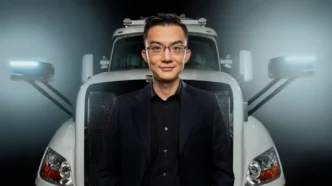TuSimple, now rebranded as CreateAI, is once again under scrutiny—this time for sending sensitive U.S. autonomous vehicle data to a Chinese firm just days after pledging to halt such activity under a federal agreement. According to The Wall Street Journal, the self-driving truck startup shared technical blueprints with Beijing-owned Foton Motor even after signing a binding national security agreement with U.S. regulators.
That deal, signed in early 2022, was supposed to firewall TuSimple’s U.S. operations from Chinese entities. Yet, only a week later, the company reportedly resumed data transfers to Foton, a Chinese truck manufacturer and subsidiary of the state-owned BAIC Group. These transfers included detailed specs on sensors, server configurations, chips, steering systems, and more—all key components of an American-made AV platform.
Regulators Warned, But No Red Line Was Crossed
Despite the apparent breach of spirit, a review by the Committee on Foreign Investment in the U.S. (CFIUS) found the transfers did not technically violate the agreement. Still, TuSimple faced penalties for other issues and agreed to a $6 million settlement without admitting fault. But the incident has reignited questions about how effectively U.S. regulators can prevent sensitive technology from reaching China through venture-backed startups.
The timing adds fuel to the fire. Just months prior, TuSimple had agreed to firewall its U.S. and Chinese operations—amid rising concern that advanced U.S. AI and autonomy research could be diverted to Chinese military-linked entities.
Follow the Data, Follow the Money
TuSimple’s story is more than a compliance slip—it’s a window into the risks of cross-border tech entanglements. In early 2023, reports surfaced that TuSimple shareholders were trying to block a $450 million fund transfer from its U.S. accounts to its Chinese subsidiary. That money was reportedly intended to pivot the company from AV trucking to AI animation and content generation, part of a broader strategic shift led by co-founder Xiaodi Hou.
Hou is now locked in a court battle to regain control of his voting shares, aiming to force liquidation of the company. In December 2024, TuSimple rebranded as CreateAI, signaling a pivot away from transportation and into generative AI. But its complicated past continues to haunt it.
Founded in 2015 by Hou and Lu Chen, TuSimple was backed by Chinese tech capital from the beginning, including ties to Sina Corp. It quickly became a U.S. AV industry leader, raising around $2 billion and executing the first fully driverless run on a public highway in the U.S. But the momentum slowed when federal investigations into its China ties surfaced, leading to its voluntary delisting from the U.S. stock market in early 2024.
Hydron, Foton, and the China AV Nexus
A deeper look reveals even more overlap. In 2021, TuSimple staff reportedly spent paid hours working for Hydron, a Chinese hydrogen-powered trucking startup founded by Lu Chen. Hydron shared an office with TuSimple China and was part of a broader CFIUS investigation into data leaks and personnel overlap.
Documents viewed by the Journal show that TuSimple arranged a deal between Hydron and Foton to jointly develop autonomous trucks. That partnership raised red flags, especially since Foton reportedly maintains a collaboration with a Chinese military university on AV systems.
Slack logs, emails, and video calls obtained by reporters revealed TuSimple shared key AV component details with its Chinese partners—including autonomy source code developed by its U.S. engineers.
A Case Study in High-Risk Tech Transfers
TuSimple’s unraveling has become a case study in national security risk, as the U.S. re-evaluates its approach to Chinese-linked tech investments. It’s helping shape new Washington policy, including efforts to block high-risk foreign transactions, particularly those involving AI, AV, and other dual-use technologies.
The TuSimple saga also highlights the limitations of current U.S. safeguards—agreements that rely heavily on company compliance, even when strategic technologies are at stake.
As global competition intensifies and tensions with China rise, TuSimple’s fall from AV pioneer to regulatory flashpoint is serving as a warning for both policymakers and startups: when national security, cross-border capital, and advanced tech collide, the consequences can reverberate for years.













